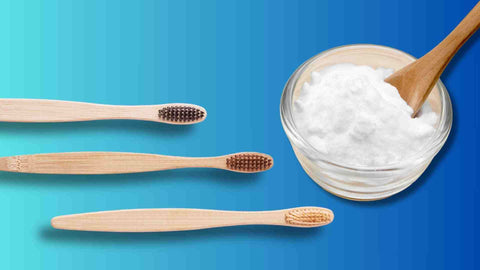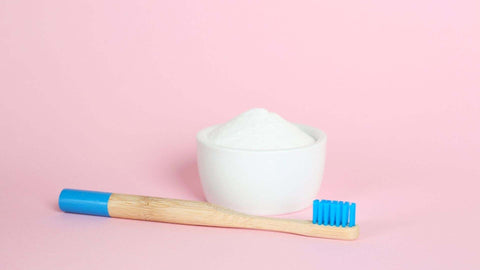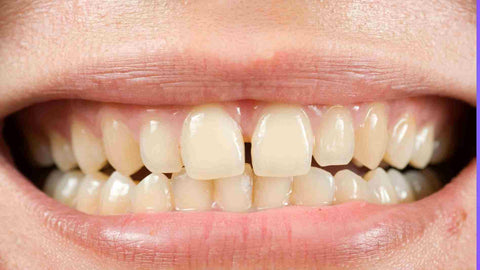Can You Brush Your Teeth with Baking Soda?
Yes, you can brush your teeth with baking soda, but it won't be a replacement for brushing your teeth with remineralizing toothpaste.
Since baking soda is a mild abrasive, it can effectively remove surface stains and whiten your teeth without causing enamel damage. Also, its alkaline properties can neutralize harmful acids in your mouth that can otherwise contribute to tooth decay.
That said, while baking soda can clean and whiten your teeth, it unfortunately doesn't have any remineralizing properties - meaning, it won't restore minerals to your enamel that have been lost due to acid erosion or decay.
Therefore, to support the remineralization of your teeth and prevent tooth decay, you'll want to use a baking soda toothpaste that contains remineralizing ingredients like nano hydroxyapatite and xylitol. These ingredients repair enamel and support a favorable environment for remineralization.
In this article, I'll explain everything you need to know about using baking soda as toothpaste.
What does baking soda do in toothpaste?

Baking soda, also known as sodium bicarbonate, in toothpaste is a gentle-yet-effective cleaning ingredient often included in toothpaste.
Its mild abrasive qualities essentially give baking soda natural whitening properties. It can help remove surface stains and clean teeth, contributing to a brighter, whiter smile without damaging the enamel. This makes baking soda toothpaste an excellent choice for daily use, especially if you're looking to remove stains caused by coffee, tea, wine, or tobacco.
Further, baking soda's natural alkalinity plays a crucial role in neutralizing the plaque acids in your mouth. These acids, produced by bacteria as they digest food particles, can erode tooth enamel and lead to cavities.
By keeping the oral environment more balanced, baking soda not only protects your enamel but also supports overall gum health.
Additionally, toothpaste that includes baking soda tackles bad breath by addressing its root cause: the acidic by-products of oral bacteria. By neutralizing these acids, baking soda helps freshen your breath, leaving your mouth feeling cleaner and more refreshed.
For those of us with sensitive teeth, brushing teeth with baking soda toothpaste can be a gentler alternative, effectively cleaning without causing discomfort.
Is baking soda in toothpaste safe?

Yes, baking soda in toothpaste is safe for most people when used as directed.
Baking soda is a mild abrasive, which makes it effective at removing surface stains from our teeth. This helps whiten them and remove plaque without damaging our enamel.
Further, baking soda's natural alkaline properties also help neutralize acids in the mouth which reduces the risk of enamel erosion and tooth decay.
Overall, baking soda in toothpaste is not only safe but also an effective way to support your oral health.
Pros of Using Baking Soda as Toothpaste

Using baking soda as toothpaste is a practice that dates back to before commercial toothpastes became widely available. It's known for its abrasive properties that help in cleaning and whitening teeth.
Here's a breakdown of the pros of using baking soda as toothpaste.
Effective at Removing Plaque
Baking soda effectively removes plaque from your teeth, offering a straightforward approach to maintaining oral hygiene.
Its abrasive nature acts as a mechanical scrubber against the biofilm of bacteria that forms plaque, the primary culprit behind dental cavities and gum disease.
By incorporating baking soda into your oral care routine, you can get the benefits of plaque removal, promoting healthier teeth and gums.
Whitens Teeth
Another advantage of baking soda is its ability to whiten your teeth. It possesses mild abrasive properties that can polish away surface stains caused by coffee, tea, and other staining agents.
This natural whitening agent can restore the natural brightness of your teeth without the need for expensive treatments or harsh chemicals, making it an appealing option for those seeking a brighter smile.
Neutralizes Acids
Baking soda also plays a crucial role in neutralizing the acids in your mouth. Its alkaline properties help balance the oral pH, combating the acid produced by bacteria that can lead to enamel erosion, cavities, and tooth decay.
Regular use of baking soda can thus protect your teeth from acid attacks, contributing to a healthier oral environment.
Inexpensive and Accessible
The cost-effectiveness and wide availability of baking soda make it an attractive choice for oral care.
Compared to commercial toothpastes, which can be pricey and contain a variety of artificial ingredients, baking soda offers a simple and budget-friendly alternative.
This accessibility ensures that maintaining oral health doesn't have to be an expensive endeavor, making it possible for more people to achieve and maintain a healthy smile.
Fewer Chemicals
Lastly, baking soda's composition is straightforward, containing no artificial sweeteners, flavors, or preservatives found in many commercial toothpastes.
For those concerned about the chemicals in their oral care products, baking soda provides a purer, more natural option.
This minimalistic approach not only supports oral health but also aligns with a lifestyle that prioritizes fewer chemicals and more natural ingredients in personal care routines.
Cons of Using Baking Soda as Toothpaste

Now that we understand the pros of using baking soda as toothpaste, let's take a look at the cons.
Lacks Remineralization
One significant drawback of using baking soda as your primary toothpaste is its lack of nano hydroxyapatite, a critical mineral for dental health.
The American Dental Association confirms that remineralization is necessary to tackle tooth decay.
Nano hydroxyapatite plays a vital role in strengthening tooth enamel and preventing cavities by aiding in the remineralization process of your teeth.
Without nano hydroxyapatite, you miss out on its protective benefits against tooth decay, making it crucial to find alternative sources of remineralization to maintain optimal oral health.
Thankfully, our baking soda toothpaste combines nano hydroxyapatite and baking soda for an awesome natural, remineralizing alternative to traditional fluoride toothpaste.
Unpleasant Taste
Perhaps understandably, many people find the taste of a baking soda dentifrice to be quite unpleasant, which can deter its use as a toothpaste alternative.
The salty and somewhat alkaline flavor doesn't provide the fresh, minty sensation that many os us associate with cleanliness and oral hygiene.
This lack of sensory satisfaction can make the brushing experience less enjoyable and may lead to a reluctance to maintain a consistent oral hygiene routine, especially for kids and people with sensitive palettes.
For these reasons, many individuals prefer our baking soda paste (toothpaste tablets) which packs a powerful, natural minty punch.
Messy and Inconvenient
Unfortunately, baking soda makes for a messy and inconvenient alternative compared to traditional toothpaste.
Its powder form lacks the cohesive paste quality that allows for easy application to a toothbrush, and it doesn't give you that satisfying foam during brushing.
This can result in a less satisfying cleaning experience and may discourage regular use, impacting your overall oral hygiene habits.
Limited Antimicrobial Properties
Lastly, baking soda's limited antimicrobial properties mean it does not effectively combat all the bacteria in your mouth responsible for tooth decay and gum disease.
While it can physically clean surfaces, it lacks the specific antibacterial ingredients found in many toothpastes designed to reduce harmful oral bacteria.
Therefore, to ensure comprehensive oral health care, you should supplement your routine with natural toothpaste in addition to brushing your teeth with baking soda.
Does baking soda whiten teeth?

Yes, baking soda can whiten teeth. Its natural abrasive properties make it effective to remove plaque and removing surface stains from your teeth, which are often caused by foods, drinks like coffee and tea, and tobacco use.
Baking soda toothpaste gently polishes the teeth's surface, restoring their natural whiteness without damaging the enamel when used correctly.
However, it's important to note that baking soda works primarily on surface stains and may not be as effective for deeper, intrinsic stains that affect the dentin beneath the enamel.
For such stains, professional whitening treatments or an over-the-counter whitening treatment that includes hydrogen peroxide may be more effective.
Frequently Asked Questions
Is it good to brush teeth with baking soda?
Yes, brushing with baking soda is good for your teeth and can be effective for removing surface stains, making it a popular home remedy for whitening teeth. Baking soda is mildly abrasive, which allows it to polish away stains from coffee, tea, and smoking without being too harsh on the enamel. Additionally, it creates an alkaline environment in your mouth, which prevents bacteria from growing, further supporting oral health. However, because of its abrasiveness, it should be used cautiously and not too frequently, as overuse can damage tooth enamel over time. Therefore, it's better to consider using nano hydroxyapatite toothpaste as it contain baking soda and nano hydroxyapatite, which can promote safe and better remineralization for your dental needs, potentially.
How fast does baking soda whiten teeth?
Baking soda can start to whiten teeth within a few days of regular use, but significant results may take several weeks. Its abrasive properties help remove surface stains, revealing a brighter smile over time. However, excessive use of baking soda alone can damage tooth enamel. Therefore, considering NOBS Toothpaste Tablets as it contain baking soda and nano hydroxyapatite, which can promote safe and better remineralization for your dental needs, potentially resulting in whiter teeth.
Can I mix baking soda with toothpaste?
Yes, you can mix baking soda with toothpaste to enhance your tooth-cleaning routine. Adding baking soda to toothpaste can improve its stain-removing power and neutralize acids in the mouth, contributing to a healthier oral environment. When doing this, use only a small amount of baking soda with your regular toothpaste to avoid excessive abrasiveness that could harm tooth enamel. However, it's advisable to consider NOBS Toothpaste Tablets, as they contain baking soda and nano hydroxyapatite, which can support more compact and better remineralization for your dental needs.
Is baking soda or baking powder better for your teeth?
Baking soda is generally considered better for dental hygiene compared to baking powder. Its mild abrasiveness helps remove surface stains and plaque, while also neutralizing acids in the mouth to reduce the risk of tooth decay. However, it's essential to use baking soda in moderation to avoid enamel damage and tooth sensitivity. Consulting with a dentist can provide personalized recommendations for maintaining optimal oral health.
How often is it safe to brush teeth with baking soda?
It's safe to brush your teeth with baking soda in moderation, typically not more than once or twice a week. This frequency helps minimize the risk of enamel abrasion due to baking soda's abrasive properties. Overuse of baking soda can lead to enamel wear over time, making teeth more sensitive and susceptible to decay. When used correctly, baking soda can effectively remove surface stains and contribute to a brighter smile without damaging the teeth.
What are the disadvantages of using baking soda to whiten teeth?
While baking soda can effectively remove surface stains and plaque from teeth, there are some disadvantages to consider. Overuse of baking soda can lead to enamel erosion, making teeth more susceptible to decay and sensitivity. Its abrasive nature can also cause gum irritation and contribute to receding gums over time. Additionally, baking soda does not contain any ingredients that is essential for remineralizing enamel and preventing tooth decay like nano hydroxyapatite. Therefore, it's important to use baking soda in moderation and consult with a dentist to ensure it's safe for your oral health.






















